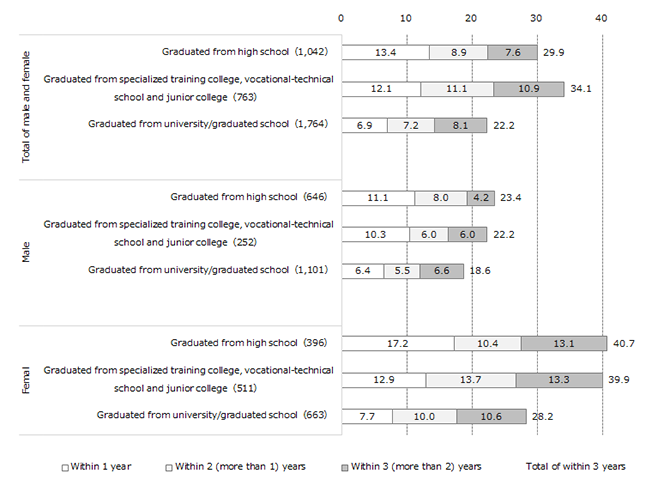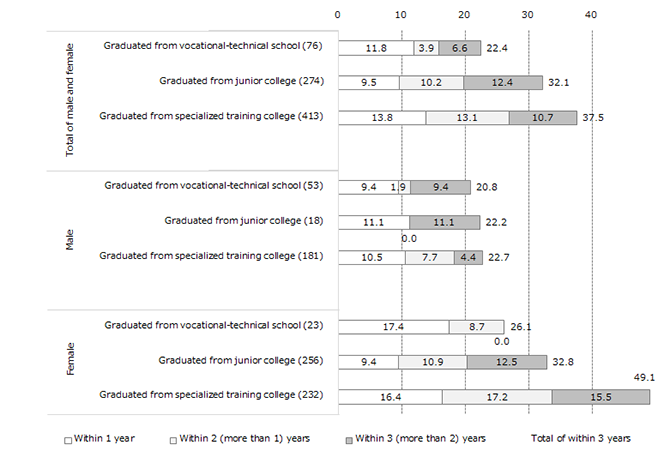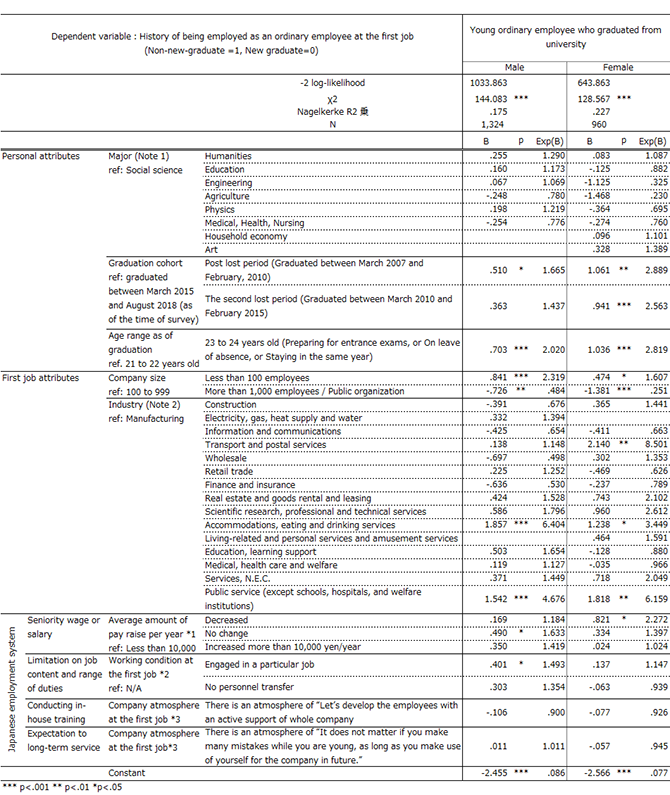JILPT Research Report No.214
Research on Difficulties and Support for Young People with Atypical Careers
March 24, 2022
Summary
Research Objective
In Japan, it had been considered "typical" for workers to start career in a stable job immediately after graduating from school and promote it through the long term in-house training with flexible personnel transfers within a single company. Nowadays the Japanese employment system which has made these career possible is being reconsidered. It is necessary to clarify the career development situation and challenges of young people who are working under the employment management not applied to the traditional employment system.
The purpose of this report is to clarify the career development challenges and context of young people and to provide recommendations for their support, by reanalyzing with a focus on their educational attainment based on the results of two surveys conducted in the JILPT's research project "Research on quality of employment and career development of young people."
Research Method
The report reanalyzes the following two survey results.
- JILPT, "The 2nd Survey on Young People's Skill Development and Retention in Workplaces," online survey on those registered with an internet survey company.
The survey targets:
20 to 33 years olds (as of April 1, 2018) who have experience of working as ordinary employees with educational attainment from high school graduates to master's degree graduates.See JILPT Survey Series No.191 and Research Material Series No. 221 for detail of the survey.
- Ministry of Health, Labour and Welfare, "Survey on Employment of Young People in 2018" (secondary analysis)
The survey targets:
Enterprise Survey: Enterprises with more than 5 regular employees nationwide
Individual Survey: Young workers from 15 to 34 years old who work at the enterprises above.See JILPT Research Material Series No.236 for detail of the survey.
Key Findings
- The rate of turnover within 3 years for the new graduates by sex and educational attainment is the highest among the women who graduated from specialized training colleges. The passive attitude of employer for the long term employment or the in-house training as well as the tendency of young people’s desire for changing jobs, independence or becoming specialists has no significant relevance with the leaving of jobs within 3 years by new graduates from specialized training colleges. The most significant factor of their turnover was the payment decrease or no change from the original amount, or the experience of rapid payment increase with the long overtime hours and such kinds.
- Compared to new graduates with the same educational attainment, former (non-new) university graduates who experienced non-regular employment or jobless before the transition to ordinary employment, have tendency among females to experience a salary reduced from the starting amount while among males to have no salary change from a starting amount and engaged in a particular job. It can be said that the salary decreases or no changes from a starting amount is a strong factor to increase turnover rate among non-new-graduates.
- High school graduates have less variety of persons to talk to about their concerns at the first job or working-related issues compared to university graduates. Such narrow social network is very likely to remain the same after leaving jobs. High school graduates have scarce social experience before starting their career compared to university graduates. Also, in the traditional Japanese-style employment (work-entry) system for high school graduates, they choose the first job with support by their high school. It can be said that their information collecting to select the path after leaving the first job tend to be narrow and biased as well.
- The probability that a young person became a low-income earner in addition to having become non-ordinary employee after graduating from a graduate school is higher for men when they got a non-professional/technical job, and higher for women when their employers set as training goals “manners and social common sense” as those are “what are considered they should acquire” if with high educational attainment like graduate degree. Those women are assumed in the situation of “over-educated,” and from such cases, deteriorating their special skills in addition to the financial difficulties are concerned.
Figure 1. Percentage of new graduates leaving jobs within 3 years by sex and educational attainment
1. Total of educational attainment

2. Breakdown of graduates of specialized training college, vocational-technical school and junior college

Source: Prepared from JILPT (2019) "The 2nd Survey on Young People's Skill Development and Retention in the Workplaces" (2018).
Figure 2. Logistics regression analysis to clarify the characteristics of the first job of non-new university graduates

Source: Prepared from JILPT (2019) "The 2nd Survey on Young People's Skill Development and Retention in the Workplaces" (2018).
Notes: 1) Eliminated from the analysis: the majors (Home economics, Art, and Others for men, and Others for women) when the number of cases are under 10.
2) Eliminated from the analysis: the industries (Mining and Quarrying of Stone and Gravel, C ompound services, and Others for men and women, Living-Related and Personal Services and Amusement Services for men, Electricity, Gas, Heat Supply and Water for women) when the number of cases are under 10.
*1 Refer Figure 3-3-2 of the source.
*2 Working conditions as of the time of leaving jobs for those who left the job, as of the time of survey for those who continue working.
*3 Convert "Applies"=5, "Somewhat applies"=4, "Cannot say either"=3, "Not much applies"=2, "Doesn't apply at all"=1.
Policy Implications
- It was implied that there is possibility to restrain the leaving of job within 3 years for the new graduates of specialized training college: the shortening of working hours for women, the careful explanation after entering the job, and the communication between the management and the general employees for men. However, the impact of these measures on turnover is extremely small for both sex compared with the impact when measures are taken related to salary and wages. It indicates that improving the basic working conditions such as wages is the first measure to take for turnover improvement.
- Having an atypical career while in university decreases the possibility to become a regular employee and, for women, increases the possibility of leaving jobs after becoming an ordinary employee as a non-new-graduate. To support proactively the young people aiming for the transition to stable employment and retention in the workplace, it is necessary to conduct a survey research covering the whole process of the early career development including the transition from young people’s experiences while in school to job hunting to the stable employment, and to retention in the workplace.
- High school graduates who left job utilize Hello Work (public employment security offices) and public job training relatively high, there is high possibility that the public support may be supplementary effective to the weakness (poor social network) of high school graduates. Individual career consulting at Hello Work should be conducted with special care by taking time when the target is high school graduates who have left jobs. Also, it is important to proactively and clearly inform high school graduates about the utilization of public job trainings, the Job Seeker Support Training, and Education and Training Benefits System.
- Among graduate-school completers who went from jobless/non-regular employment to regular employment in lower-income groups, the percentage of person who refers to teachers’ or senior alumni’s advice in transition process and appreciates the effectiveness of school’s vocational guidance is higher compared to university graduates who went through the same kind of career path. For graduate school graduates who are non-regular employees, it would be effective that universities establish support systems which such graduates can utilize the network of teachers and alumni.
Contents
JILPT Research Report No.214, full text (PDF:2.3MB) [in Japanese]
Category
- Human resources management/vocational skills development
- Employment/unemployment
- Working conditions/work environment
Research Period
April 2017—March 2021
Authors (Order of writing)
- IWAWAKI Chihiro
- Senior Researcher, Labour Quality Management and Career Development, The Japan Institute for Labour Policy and Training
- KOSUGI Reiko
- Research Fellow, The Japan Institute for Labour Policy and Training
- KUBO Kyoko
- Assistant Fellow, Labour Quality Management and Career Development, The Japan Institute for Labour Policy and Training
JILPT Research Report at a Glance
| To view PDF files, you will need Adobe Acrobat Reader Software installed on your computer.The Adobe Acrobat Reader can be downloaded from this banner. |

